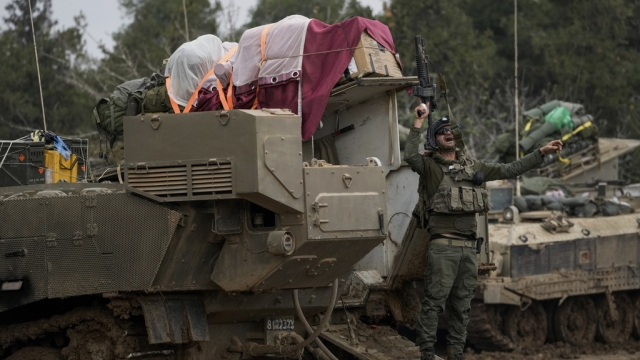President Joe Biden said he wants Israel to be "more careful" as the White House balances concerns over the civilian toll in Gaza with support for Israel in its war against Hamas.
"I want them to be focused on how to save civilian lives — not stop going after Hamas, but be more careful," Biden said Thursday.
The comments come as National Security Adviser Jake Sullivan met with top Israeli leaders this week, who vow to continue fighting until Hamas is defeated.
"It will require a long period of time. It will last more than several months. But we will win, and we will destroy them," Israeli Defense Minister Yoav Gallant told Sullivan.
Sullivan reiterated support for Israel in conversations a senior administration official described as substantive and detailed, including on the humanitarian situation, regional threats, the military campaign and the future of Gaza.
In meeting with the Israeli war cabinet, Sullivan received a detailed presentation of Israel's military campaign and next steps.
In talks, the administration has in part focused on transitioning from high-intensity to lower-intensity operations, "…from high-tempo clearance operations, high-intensity clearance operations, which are ongoing now, to ultimately lower-intensity focus on high-value targets, intelligence-driven raids and those sort of more narrow surgical military objectives," a senior administration official said on the condition of anonymity.
While an official said the Israelis briefed them on potential time frames, the administration has been careful to not publicly dictate one.
"What we're talking to them about is transitioning relatively soon from a high-intensity level of operations to low intensity, and certainly we're interested in their thinking about how long that transition will take to occur, but this is not new that they would be at this for months. I mean, this is a difficult threat that they're facing. Obviously as I've said before there's no reason for it to last another day. Hamas could just do the right thing again," National Security Council coordinator for strategic communications John Kirby said.
SEE MORE: Ambush kills 9 Israeli soldiers in Gaza City
Sullivan's visit to the area comes days after President Biden noted waning international support during a campaign reception, stating, "... they're starting to lose that support by the indiscriminate bombing that takes place."
The White House, when pressed for clarification on the comment, has underscored concern over civilian harm and what it views as Israel's intention and steps to mitigate civilian harm as the U.S. urges them to be careful in targeting.
An official said Israel briefed them during Sullivan's visit on efforts being taken to differentiate civilians, noting there was a "deep, detailed discussion" on Israel's campaign.
"At the same time, it's important that they have the tools and capabilities they need to go after a truly genocidal threat represented by Sinwar and these Hamas terrorists," said Kirby, as the U.S. continues the flow of security aid to Israel.
The administration did not confirm media reports that nearly half of munitions Israel has used in Gaza were "dumb bombs," first reported by CNN.
Generally, military analysts see Israel using precision-guided munitions when they have identified high-value Hamas targets, moving targets or ones near sensitive sites or dense urban areas in efforts to minimize collateral damage, according to a U.S. official. When those are not used, analysts see Israel using "dive bombing," which has a lower flight altitude and releases payload in closer range for more precision, according to the official.
As Israel works to maneuver Hamas' system of tunnels in Gaza, a senior administration official said Israel wants to ensure the entrances are not accessible, stating one of the initiatives includes an idea to use seawater to flood some of the tunnels.
Meanwhile, Sullivan also met with Mossad's director, David Barnea, for a discussion on the hostages, on the heels of a visit from families of Americans held hostage to the White House.
SEE MORE: President Biden warns Israel its Gaza campaign is costing it support
"We still believe another pause is possible. We still want to get both sides to the table to work that out and we're on the ground doing that," Kirby said.
A senior administration official said the agreement to facilitate the release of women and children previously broke down when Hamas recategorized young women, some taken from the music festival, as soldiers when they are not.
"The issue now is whether and how to try to get this process back on track again, starting with those women. And Hamas has acknowledged that they are holding, but they have refused to release. There are a number of initiatives now being pursued. I cannot state with any confidence which initiative might gain traction," the official said.
Sullivan is also expected to visit with Palestinian Authority leaders in the West Bank Friday.
The administration said it was working with Israel, the Palestinians and other partners to look at "contingencies" amid focuses on what happens next in Gaza.
"There are a number of security personnel linked to the Palestinian Authority, which we think might be able to provide some sort of a nucleus in the many months that follow the overall military campaign. But this is something we are discussing with the Palestinians and with the Israelis and with regional partners, and it very much remains a work in progress," a senior administration official.
But amid the visit to Israel, a public split over the future of Gaza continued to emerge as the United States has continued to back a two-state solution.
Israeli President Isaac Herzog told The Associate Press in an interview, "What I want to urge is against just saying two-state solution. Why? Because there's an emotional chapter here that must be dealt with."
Trending stories at Scrippsnews.com





